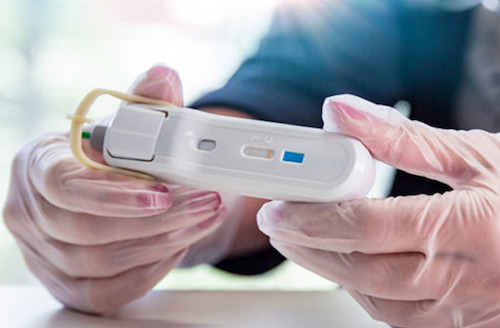Lumos CEO on how LDX came back from brink of death to rise 8x, and what to expect next

Lumos share price has surged by 8x after FDA approval on FebridX. Picture Getty
- Lumos share price has surged by 8x after FDA approval on FebriDx
- FebriDx is a test kit that helps doctors decide whether to prescribe antibiotics
- Stockhead reached out to Lumos CEO, Doug Ward
Investors looking for insane gains often look no further than the biotech space, a sector with a high risk/reward profile. Stocks in this segment can soar (or crash) massively based on one test result or regulatory decision.
Take Lumos Diagnostics (ASX:LDX).
The LDX share price has bounced back from a near death experience as it surged by 8x this month.
Investors piled back into the ticker after the company announced an approval from the US Food and Drug Administration (FDA) to market its FebriDx rapid, point-of-care test in the United States.
The clearance allows FebriDx to be marketed in the US for use by healthcare professionals as an aid in the diagnosis of bacterial acute respiratory infection.
Prior to the announcement, the company was in the brink of death after its submission was rejected by the FDA in July 2022, and once again at the appeal stage in October 2022.
The FDA decision led to the closure of Lumos’ Sarasota manufacturing facility as the company tried to minimise cash burn.
Lumos’ CEO Doug Ward, who was appointed as CEO just before the initial FDA decision, told Stockhead the big positive from all this is seeing how some investors have been very patient.
“They’ve said that hey, we believe in this company, which has a great IP, a great leader in technology, and believe that FebriDx is a great idea,” Ward said.
“This FDA approval is the first step in our turnaround, and now we need to put our money where our mouth is and follow through to deliver to our shareholders.”
FebriDx can tell if an infection is bacterial or viral
FebriDx is a diagnostic test kit designed to aid in the differentiation of bacterial and viral acute respiratory infections (ARIs), and help guide decisions regarding the prescription of antibiotics.
It’s intended to be used in conjunction with clinical signs and symptoms, including other clinical and laboratory findings.

Apart from the US, the kit is already registered in the UK, Europe, Canada, UAE, Brazil, Turkey, Pakistan, Singapore, Malaysia and Australia.
“FebriDx is basically used as an aid to help physicians to differentiate a bacterial respiratory infection from a non-bacterial one,” explained Ward.
The term ‘non-bacterial’ here could be replaced with ‘viral’ elsewhere but in the US, non-bacterial is used because you can technically have an infection which creates that host immune response other than just viral.
“FebriDx helps the physician decide whether they should prescribe antibiotics to treat the infection or not,” he added.
Previous research indicated that the inappropriate and unnecessary prescribing of antibiotics is a significant contributing factor to the growing global emergence of antimicrobial resistant (AMR) strains of bacterial pathogens.
In 2021, US healthcare professionals in outpatient settings issued 211 million prescriptions for antibiotics — equivalent to 636 prescriptions per 1,000 persons.
Despite acute respiratory infections being predominantly viral in origin, they are the most common diagnosis for which antibiotics are prescribed and up to 40% of these prescriptions are considered unnecessary.
“If you have viral or other types of infections, you don’t want to be given antibiotics. Inappropriate and over-treatment of antibiotics means that you get resistance to the antibiotics,” Ward said.
“With the FebridX test, within 10 minutes, it will tell you whether you have a bacterial infection and whether an antibiotics should be prescribed.”
More than just FebriDx
Following the FDA approval, Lumos completed a $4.75m cap raise to institutional investors, and has launched another $4.75m Share Purchase Plan (SPP) to eligible shareholders.
The company said funds raised would be used to buy back outstanding convertible notes, and to provide general working capital.
Ward said that the company will remain cautious about how it spends the money despite the FDA approval.
“Before I joined, we had built huge amounts of inventory of other products that didn’t eventually make it and we had significant write offs as a result,” said Ward.
These writeoffs have hurt the bottom line and in turn, the company’s share price.
“Now cash is very, very precious to us. So we chose not to pre-manufacture anything prior to the announcement.”
The company is now in the process of ordering all the components, and investing its money into the supply chain.
“After that, we’ll start to gear up manufacturing and selling later on in the year.”
Ward expects that the next set of news flow for the company would be around commercial deals for FebriDx.
“It’s an economic story, and it’s one that takes time.”
Apart from FebriDx, the lion share of Lumos’ business is actually in developing and manufacturing tests for other diagnostic companies.
During the March quarter, Lumos generated $1.9 million from the provision of diagnostic test development services and contract manufacturing for its clients.
“I think we’re also going to see some nice announcements around additional services and partnerships. I think they’re going to be pretty substantial in the future,” said Ward.
Lumos Diagnostics share price today:
Related Topics

UNLOCK INSIGHTS
Discover the untold stories of emerging ASX stocks.
Daily news and expert analysis, it's free to subscribe.
By proceeding, you confirm you understand that we handle personal information in accordance with our Privacy Policy.








